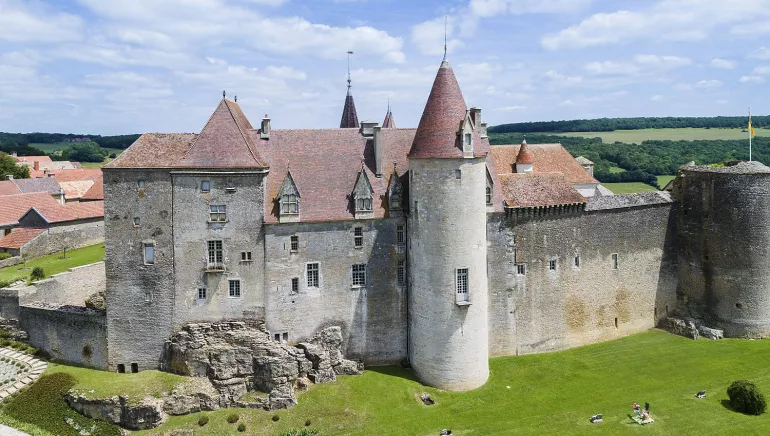Château de Châteauneuf
The history of the château begins in 1175 with a keep built on a promontory overlooking the valley through which the Burgundy canal now flows. A sumptuous chapel was built in the 13th century. In the 14th and 15th centuries, it was fortified with a powerful wall and five defensive towers.
Around 1460, Philippe Pot, Seigneur de la Roche (Château de la Rochepot), became the owner of the château. He was a private adviser to the Duke of Burgundy, Philip the Good, and one of the knights of the Order of the Golden Fleece. He rebuilt the fortress and refurbished the chapel. The mantelpiece of the Great Hall's monumental fireplace still bears Philip Pot's motto "Tant L Vault", dedicated to the Virgin Mary. The chapel is entirely decorated with 15th century murals depicting Christ and the apostles. Also worth seeing is the polychrome replica of Philippe Pot's tomb, the original of which is kept in the Louvre Museum. From the 16th century onwards, the château was owned by several prominent families, including the Montmorency and Vienne families. In 1936, Count Georges de Vogüé donated the château to the State. The collections were regularly enhanced, notably with a fine suite of 7 17th-century tapestries depicting episodes in the life of Moses. Apart from a few interior alterations, the château has retained its medieval character.
In 2008, the Burgundy-Franche-Comté Region volunteered to continue restoring the château, making it the centrepiece of a heritage and cultural project linked to the region.
An unprecedented restoration campaign will run from 2022 to 2024. It has resulted in improvements to the visitor experience, including the construction of a new reception area and shop, disabled access for most of the site, and the opening of new museum areas. The whole site is enhanced by an innovative landscaping project.
As well as being a tourist attraction, the château is also part of the region's identity and collective memory.
Visits, activities, summer events, exhibitions, archaeological research... it's a living monument that can't be ignored!
Around 1460, Philippe Pot, Seigneur de la Roche (Château de la Rochepot), became the owner of the château. He was a private adviser to the Duke of Burgundy, Philip the Good, and one of the knights of the Order of the Golden Fleece. He rebuilt the fortress and refurbished the chapel. The mantelpiece of the Great Hall's monumental fireplace still bears Philip Pot's motto "Tant L Vault", dedicated to the Virgin Mary. The chapel is entirely decorated with 15th century murals depicting Christ and the apostles. Also worth seeing is the polychrome replica of Philippe Pot's tomb, the original of which is kept in the Louvre Museum. From the 16th century onwards, the château was owned by several prominent families, including the Montmorency and Vienne families. In 1936, Count Georges de Vogüé donated the château to the State. The collections were regularly enhanced, notably with a fine suite of 7 17th-century tapestries depicting episodes in the life of Moses. Apart from a few interior alterations, the château has retained its medieval character.
In 2008, the Burgundy-Franche-Comté Region volunteered to continue restoring the château, making it the centrepiece of a heritage and cultural project linked to the region.
An unprecedented restoration campaign will run from 2022 to 2024. It has resulted in improvements to the visitor experience, including the construction of a new reception area and shop, disabled access for most of the site, and the opening of new museum areas. The whole site is enhanced by an innovative landscaping project.
As well as being a tourist attraction, the château is also part of the region's identity and collective memory.
Visits, activities, summer events, exhibitions, archaeological research... it's a living monument that can't be ignored!
Diese Einrichtung ist Accueil Vélo und bietet spezielle Dienstleistungen für Radfahrer an.
Contact par mail
* Pflichtfelder
Ein Problem mit dieser Einrichtung melden
* Pflichtfelder
